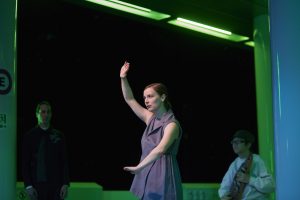Toshiki Okada, one of the most important Asian directors, presents his latest work, Nō Theater, at the Kammerspiele. A stage director and author, Okada founded the theatre group chelfitsch – a pun on the word “selfish”, in 1997. His poetic-musical work focuses on the societal problems of contemporary Japan and is greatly influenced by Bertolt Brecht’s Verfremdungseffekt, often tearing down the fourth wall. His productions have received various awards. Hot Pepper, Air Conditioner and the Farewell Speech (2009), Current Location (2012) and Ground and Floor (2013) have all been shown in Europe, Super Premium Soft Double Vanilla Rich (2014) was presented at the festival Theater der Welt in Mannheim.

Courtesy of Münchner Kammerspiele.
Nō Theater is Toshiki Okada’s second production at the Munich Kammerspiele after Hot Pepper, Air Conditioner and the Farewell Speech. Okada uses the classic structure of the traditional Japanese Nō theatre and applies it to contemporary Japan, analysing economic and societal transitions and crises and their effects on Japanese society. The dream play in two parts features the waki – a messenger or monk -, the protagonist (shite) – the ghost or being in transition – who tells the actual story, and supporting characters (tsure) as well as a musical chorus.
The play is set in Tokyo, in the underground stations Roppongi and Tochōmae (Tokyo Town Hall) – places of transition and fleeting encounters. Roppongi is a metaphor for Tokyo as a centre of finance, a trendy neighbourhood for the rich. with the “ghost” ruling over this world, responsible for the disenfranchisement of the younger generation as Japanese capital has disappeared and jobs were outsourced. Tochōmae represents Tokyo as the capital of Japan. Built in the 1980s, the Tocho aka “Bubble Tower” cost about 1 billion pounds and stands for the greed and megalomania of that time.
Nō 1: Roppongi
A nameless young man (Thomas Hauser) enters. He considers his situation hopeless – the world does not need him, he will never prosper but he has time in abundance which is why he finds himself in Roppongi. His recitation about the ills in Japanese society is accompanied by a musician (Kazuhisa Uchihashi) on a daxophone/harp guitar. Other passengers enter and are waiting on the platform as the light turns green and a middle-aged man (Stefan Merki) appears. He walks very slowly, his movements are sparse and measured. A station agent (Jelena Kuljić) speaks for the Man at first before she’s merely comments on his actions. The Man compares himself with the country that has aged like him – neither of them are young and promising any more. The Man used to be an investment banker before he committed suicide by jumping in front of a train. He has to appear as a ghost and tell his story to atone for his sins. The Man explains how the disaster had its beginning in New York City in 1985 when the G-5 countries met and decided to devalue the Dollar against the Yen which led to a recession in Japan as exports became too expensive. It was also the beginning of the bubble so deflation and depression were danced away.
Kyōgen: Gertrud
Nō plays always have a short, amusing interlude called kyōgen. In Okada’s production, an actress (Anna Drexler) is on her way to rehearsal. She is playing Gertrude in Hamlet and talks about the different techniques one uses for memorising one’s lines while she is waiting for her underground train.
Nō 2: Tochōmae (Tokyo Town Hall)
As the Man explained in Nō 1, Japan is a country going downhill with an ageing generation, becoming frail and decrepit like its population – it is becoming a “super aged society”, where a quarter of the population is 65+. However, the societal changes necessary to raise the birth rate have not happened as the “Ghost of Feminism” (Anna Drexler and Maja Beckmann) explains to the young man (Thomas Hauser) who visits Tokyo for the very first time. The young man is planning to visit Town Hall and then move on to the Park Hyatt Hotel and have a drink at the bar, made famous by the film “Lost in Translation” (2003), when a woman approaches him – the ghost of an MP, based on the independent MP Ayaka Shiomura, who was subjected to verbal abuse with a sexist tone whilst asking a question in parliament. The ghost represents the anger of women past and present and demands reform so their souls can rest in peace: “The chance to transform this world into something great was frustrated. Change is necessary for the survival of society: Are you able to help our souls rest in peace?”
The production is sensitively and expertly directed by Toshiki Okada and the issues that are discussed in his play are still highly relevant and well presented. However, the structure of a Nō play necessarily distances the audience from the characters on stage which prevents empathy with the characters. The cast seem to struggle somewhat with the strictly codified grammar of movements of Nō theatre, which have become so subtle over the centuries, that only an audience familiar with the code can truly understand their meaning. Still the production is intriguing in its strangeness – the slow pacing, the recitations on just one note and the highly stylised movements – and truly a thing of beauty. 4/5
Review written by Carolin Kopplin
NŌ THEATER will return on 29th June, 12th July and 20th July 2017. For more information on Chelfitsch Theatre, visit here…
The production is in German with English surtitles.


Leave a Comment